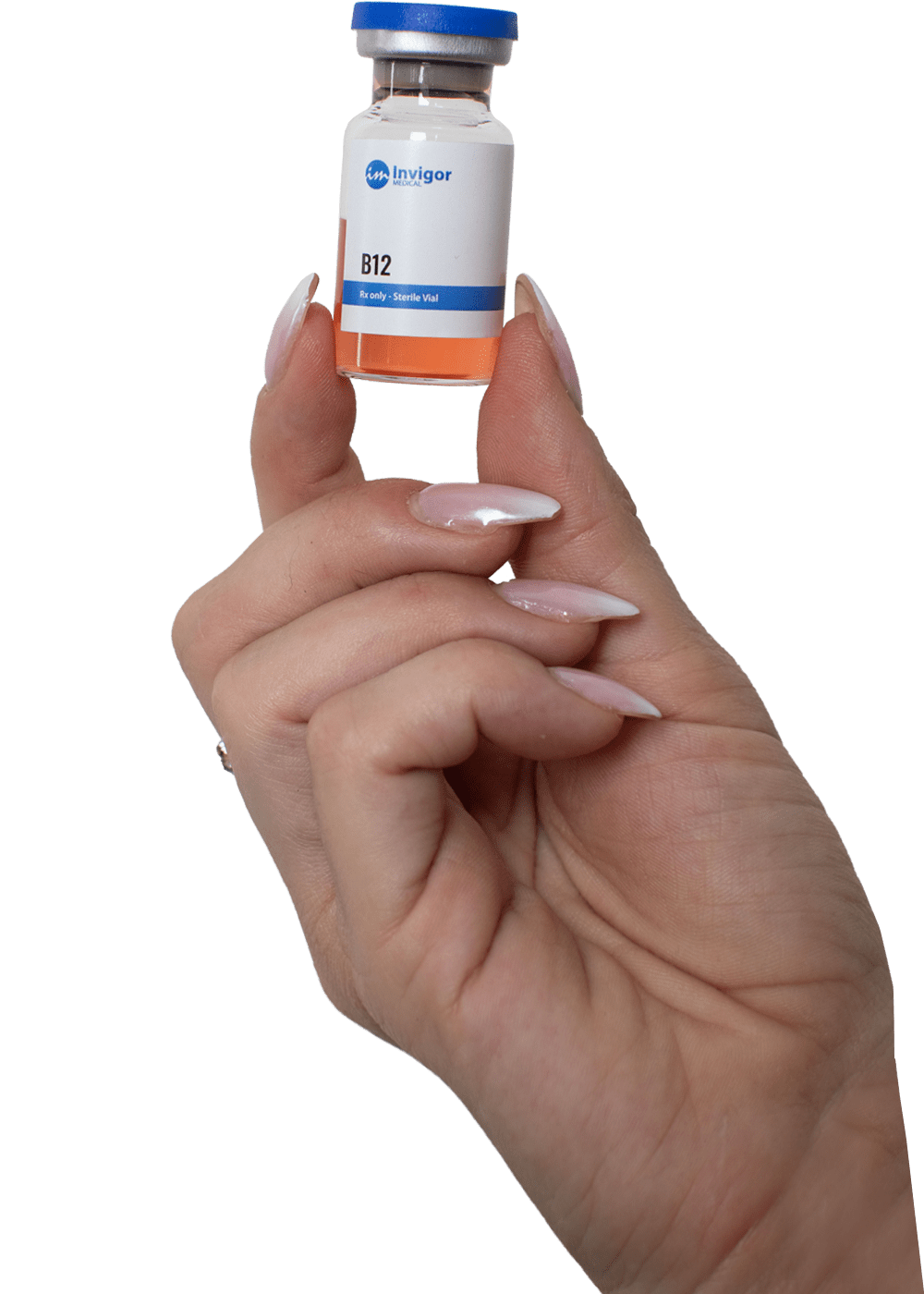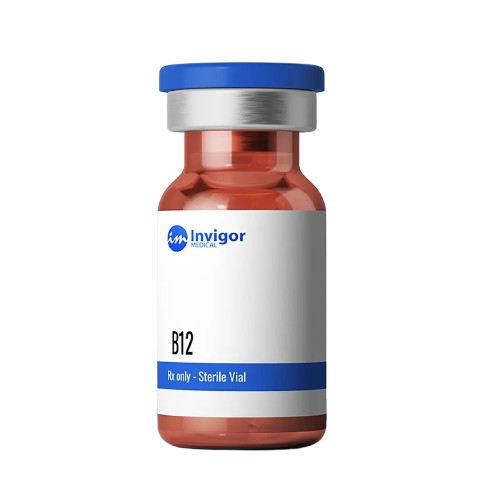According to the National Institutes of Health (NIH), vitamin B12 provides multiple benefits. It’s essential for blood health and helps protect against some blood-related diseases, such as anemia. It also supports nerve cells and DNA synthesis.
B12 is particularly effective in treating some types of nerve pain. It can spur cell growth to help regenerate damaged nerves and reduce chronic nerve pain. Doctors may order blood tests to check B12 levels in some patients with nerve problems. If there is a deficiency, they may try to correct it with dietary changes, oral supplements, or injections.
Here’s a closer look at the role vitamin B12 plays in dealing with nerve pain.
Table of Contents
The Role of Vitamin B12 in the Body
B12 is important for blood health because it supports the formation of red blood cells, which are necessary to carry oxygen through the bloodstream.
Red blood cell deficiencies can lead to anemia, which causes fatigue, general weakness, headaches, and dizziness.
B12 supports the production of enzymes necessary to synthesize the nucleotides that are the building blocks of DNA.
One of the important components B12 helps synthesize is myelin, which supports nerve functionality and repair after nerve damage. B12 also helps with nerve metabolism and energy production to ensure proper nervous system functioning.
Vitamin B12 and Nerve Pain: The Connection
When B12 levels dip, myelin production can be impaired. The lack of protection and repair capabilities can leave nerves vulnerable to damage. In the long term, this vulnerability can lead to a condition called neuropathy.
Neuropathy causes nerve pain, including burning, tingling, and numbness. The symptoms often appear in the hands and feet. In some cases, vitamin B12 deficiency can contribute to neuropathy, highlighting the potential benefit of making B12 supplementation part of nerve pain treatment regimens.

Types of Nerve Pain Treated With Vitamin B12
Though research on the use of vitamin B12 for nerve pain is ongoing, there’s evidence suggesting its effectiveness in treating specific types of neuropathic pain. These include peripheral neuropathy, which is pain, numbness, and tingling in the hands and feet. It can also help with sciatica (nerve pain in the lower back and legs) and diabetic neuropathy (diabetes-related nerve pain throughout the body).
Other research suggests that conditions like trigeminal neuralgia, which affects the facial nerves, can also improve with B12 supplementation.
Here’s a closer look at each of these nerve conditions and how B12 can improve them.
Vitamin B12 and Sciatica
Sciatica is pain that shoots down the sciatic nerve (buttock, leg, and foot). It can come from a herniated disc or bone overgrowth in the spine. There hasn’t been extensive research on vitamin B12 to treat sciatica, but at least one study has shown promising results.
A study in the European Review for Medical and Pharmacological Sciences found that B12 injections lowered the need for painkillers in patients suffering from sciatic nerve pain. The results held even for patients who did not have a B12 deficiency.
Vitamin B12 and Peripheral Neuropathy
Research suggests a common link between B12 deficiency and peripheral neuropathy. Vitamin B12 deficiency is a common cause of general nerve pain. This is because a lack of the vitamin inhibits myelin production, leaving nerves vulnerable to damage.
A survey of two dozen studies showed that B12 can be an effective treatment for peripheral neuropathy for both short-term pain relief and longer-term nerve regeneration.

Vitamin B12 and Diabetic Neuropathy
Diabetic neuropathy is nerve pain due to diabetes. It’s feelings of pain, numbness, and weakness in the hands and feet. Unlike other conditions, this one isn’t directly caused by B12 deficiency. However, some research suggests that the vitamin can be part of an effective pain management plan.
For example, one study in the medical journal Nutrients found that long-term B12 supplementation reduced pain and improved some nervous system functions like control of sweating. However, it’s important to understand that, in this case, B12 supplementation is secondary to managing diabetes.
Vitamin B12 and Trigeminal Neuralgia
Trigeminal neuralgia causes intense facial pain. The condition is linked to damage in the trigeminal nerve. Researchers haven’t directly linked the condition to a B12 deficiency. The most common causes are mistakes during dental procedures or trauma to the face.
Research has explored the use of high-dose vitamin B12 injections for trigeminal neuralgia management. Studies have shown promising results. Research published in the Journal of Oral Biology and Craniofacial Research pointed to significant pain relief with B12 supplementation used as part of a holistic pain management approach.

Recommended Dosage and Administration of Vitamin B12 as a Supplement for Nerve Pain
Research has produced strong links between nerve pain reduction and B12 supplements. However, it’s crucial to note that a one-size-fits-all dosage doesn’t exist. You need to consider the following factors when discussing dosage with your doctor.
- Severity of B12 deficiency: If a confirmed B12 deficiency is present, some doctors will give daily injections to correct the deficiency before switching to a more infrequent maintenance dose.
- Type of nerve pain: Research suggests varying degrees of effectiveness for B12 depending on the specific type of nerve pain. For instance, supplements may be effective for peripheral or diabetic neuropathy, but there is less evidence to support pain relief for sciatic nerve damage.
- Individual absorption: Factors like age and digestive health can affect B12 absorption. Oral supplements might not be as effective in individuals with certain conditions. In these cases, injectable B12 might be more effective.
Because of these various factors, you should consult a doctor before deciding on a B12 supplementation regimen.
Vitamin B12 Sources and Supplements
You have three different options for increasing your B12 intake. Injections and oral supplements can address a deficiency, but you can also adjust your diet to add B12-rich foods.
Here’s a closer look at each of these options.

Vitamin B12 Injections
Vitamin B12 injections deliver the vitamin straight into the bloodstream. This can be particularly beneficial for individuals with digestive disorders or those who struggle to absorb nutrients naturally.
You can administer B12 injections yourself or have a doctor or nurse give them to you.
One of the main benefits of B12 injections is their increased bioavailability compared to oral supplements. Bioavailability means a higher percentage of the vitamin reaches the bloodstream. This quality can be especially crucial for those with confirmed B12 deficiency or specific nerve pain conditions, where a quicker and more targeted approach can bring pain reduction benefits rapidly.
The optimal dosage for B12 injections depends on different factors. The severity of a B12 deficiency plays a key role, as does the type and severity of nerve pain. Further, factors like age and kidney function can affect B12 excretion and may influence the recommended dosing frequency. In some cases, doses of 1,000 to 2,000 mcg are common for treating B12 deficiencies.
Vitamin B12 Oral Supplements
For many, vitamin B12 oral supplements provide a convenient and effective way to increase B12 intake. Oral supplements come in various forms, including tablets, capsules, lozenges, and even gummies. They offer an easy and painless method to incorporate B12 into your daily routine.
However, absorption rates of oral B12 supplements can vary depending on individual factors. If you have digestive problems or anemia, you may struggle to absorb vitamins in the usual way through your small intestine.
Finally, dietary habits and overall lifestyle can also influence B12 absorption. Those following a vegan diet or with a history of heavy alcohol consumption might need higher B12 supplement dosages.

Vitamin B12 Dietary Sources
Naturally occurring vitamin B12 is usually found in animal products. Incorporating a variety of these B12-rich foods into your diet is a great way to increase your intake.
Red and white meat — such as beef, lamb, chicken, and turkey — are good sources of B12. Organ meats, particularly liver and kidney, are exceptionally high in the vitamin. Seafood, including salmon, sardines, trout, clams, and mussels, are also excellent dietary sources. Dairy is also a good source of B12.
Vegetarians and vegans often look to fortified plant-based milks and plant-based meat alternatives. In these instances, you need to check the labels to see the B12 content of the products.
Potential Side Effects and Considerations
Vitamin B12 is generally safe at recommended doses, but side effects like headache, nausea, or stomach upset can occur with high-dose supplementation. You should consult a physician to minimize the risks of a B12 overdose and ensure proper dosage for your individual needs.
B12 interactions with other medications are also a consideration. For example, stomach acid medications, such as proton pump inhibitors, and some diabetes medicines can interfere with the absorption of B12 supplements.
How To Start Vitamin B12 Treatment for Nerve Pain
If you think your nerve pain is related to a vitamin B12 deficiency, consider consulting a doctor. A general practitioner or neurologist can use a physical exam and blood or urine tests to measure the level of B12 in your system. Then, they can decide if B12 injections or oral supplements will help address pain and correct the nutrient imbalance.
While a doctor can offer injections, you can also purchase injections to self-administer. These can be useful for long-term management of a deficiency.
B12 can be an important part of treatment for various types of nerve pain. Since nerve conditions are sometimes due to a vitamin deficiency, a doctor might suggest B12 injections to ensure enough of the vitamin gets into your bloodstream and to the affected nerve.










